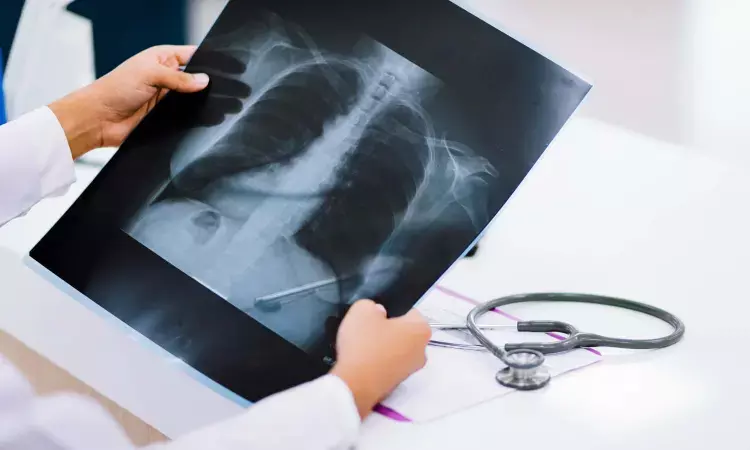- Home
- Medical news & Guidelines
- Anesthesiology
- Cardiology and CTVS
- Critical Care
- Dentistry
- Dermatology
- Diabetes and Endocrinology
- ENT
- Gastroenterology
- Medicine
- Nephrology
- Neurology
- Obstretics-Gynaecology
- Oncology
- Ophthalmology
- Orthopaedics
- Pediatrics-Neonatology
- Psychiatry
- Pulmonology
- Radiology
- Surgery
- Urology
- Laboratory Medicine
- Diet
- Nursing
- Paramedical
- Physiotherapy
- Health news
- Fact Check
- Bone Health Fact Check
- Brain Health Fact Check
- Cancer Related Fact Check
- Child Care Fact Check
- Dental and oral health fact check
- Diabetes and metabolic health fact check
- Diet and Nutrition Fact Check
- Eye and ENT Care Fact Check
- Fitness fact check
- Gut health fact check
- Heart health fact check
- Kidney health fact check
- Medical education fact check
- Men's health fact check
- Respiratory fact check
- Skin and hair care fact check
- Vaccine and Immunization fact check
- Women's health fact check
- AYUSH
- State News
- Andaman and Nicobar Islands
- Andhra Pradesh
- Arunachal Pradesh
- Assam
- Bihar
- Chandigarh
- Chattisgarh
- Dadra and Nagar Haveli
- Daman and Diu
- Delhi
- Goa
- Gujarat
- Haryana
- Himachal Pradesh
- Jammu & Kashmir
- Jharkhand
- Karnataka
- Kerala
- Ladakh
- Lakshadweep
- Madhya Pradesh
- Maharashtra
- Manipur
- Meghalaya
- Mizoram
- Nagaland
- Odisha
- Puducherry
- Punjab
- Rajasthan
- Sikkim
- Tamil Nadu
- Telangana
- Tripura
- Uttar Pradesh
- Uttrakhand
- West Bengal
- Medical Education
- Industry
Achalasia diagnosis simplified to AI plus X-ray, suggests study

Achalasia is a disease caused by impaired movement of the esophagus. Patients experience food getting stuck and regurgitated, as well as chest pain. Currently, upper gastrointestinal endoscopy and high-resolution manometry are commonly used for diagnosis; however, these techniques are invasive.
Achalasia has some distinct features that are visible on plain chest X-ray such as twisting or dilation of the esophagus, and fluid retention. However, these signs are vague in most cases, and for this reason, X-rays normally require swallowing barium to diagnose the condition.
A research group from Osaka Metropolitan University Graduate School of Medicine led by Dr. Tadashi Ochiai, Dr. Akinari Sawada, and Associate Professor Daiju Ueda created an AI model for diagnosing achalasia that uses plain chest X-ray imaging to identify the distinct features of the disease, which successfully diagnosed the disease.
The research team trained their AI model using 207 chest X-rays from 144 patients with esophageal achalasia and 240 chest X-rays from 240 age- and sex-matched non-achalasia patients. The diagnostic capability of the AI model was then verified using a test dataset consisting of 17 chest X-rays from 17 patients with esophageal achalasia and 64 chest X-rays from 64 patients without achalasia.
The diagnostic performance of the AI model was highly accurate (AUC 0.964, sensitivity 0.941, and specificity 0.891). The diagnostic performance of the AI model demonstrated higher sensitivity and specificity than physicians who reviewed the same images.
“There are reports indicating that from the onset of symptoms to diagnosis, esophageal achalasia takes an average of 6.5 years. Delayed diagnosis may worsen esophageal dilation and tortuosity and reduce treatment efficacy; therefore, early diagnosis is desirable,” Dr. Sawada said. “In Japan, chest X-rays are commonly taken during regular health checkups. Based on the findings of this study, it may be possible to screen for esophageal achalasia in a simple and minimally invasive manner.”
Reference:
Tadashi Ochiai, Artificial Intelligence-Based Detection of Achalasia on Plain Chest Radiography, Clinical Gastroenterology and Hepatology, DOI:10.1016/j.cgh.2025.08.024
Dr Kamal Kant Kohli-MBBS, DTCD- a chest specialist with more than 30 years of practice and a flair for writing clinical articles, Dr Kamal Kant Kohli joined Medical Dialogues as a Chief Editor of Medical News. Besides writing articles, as an editor, he proofreads and verifies all the medical content published on Medical Dialogues including those coming from journals, studies,medical conferences,guidelines etc. Email: drkohli@medicaldialogues.in. Contact no. 011-43720751


